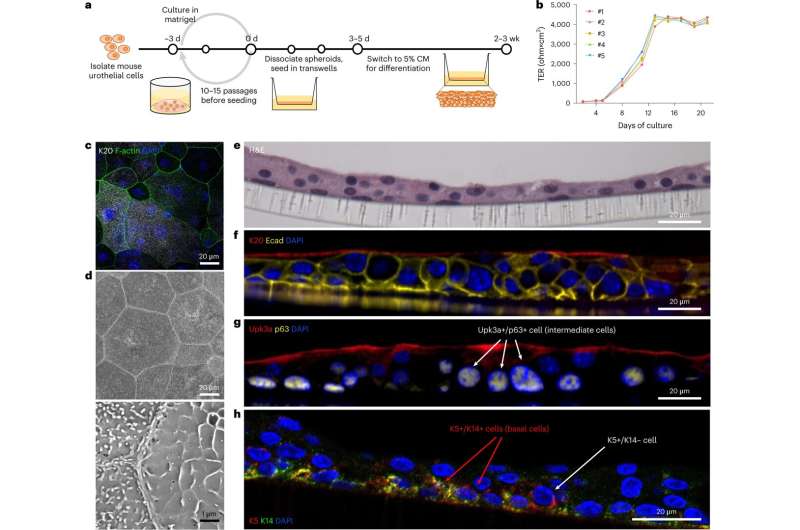April 18, 2023 report
This article has been reviewed according to Science X's editorial process and policies. Editors have highlighted the following attributes while ensuring the content's credibility:
fact-checked
peer-reviewed publication
trusted source
proofread
Hidden epigenetic mechanisms behind chronic UTIs found

Published in Nature Microbiology, a study in mice finds that the microbial basis for urinary tract infections can include localized epigenetic alterations that make additional infections more likely.
Previous urinary tract infections (UTIs) are known to predispose patients to future infections, but the mechanisms behind the recurrences are not well understood. Researchers from the Washington University School of Medicine in St Louis followed up on their previous research, which found differential epithelial cellular changes after UTIs in mice bladders, leading to different outcomes.
The current study, "Uropathogenic Escherichia coli infection-induced epithelial trained immunity impacts urinary tract disease outcome," compared urothelial stem cell (USC) lines isolated from mice with a history of either resolved or chronic uropathogenic Escherichia coli (UPEC) infection, and found epigenetic changes, including differences in chromatin accessibility, DNA methylation and histone modification. A News & Views article on the research was published in the same journal issue.
One clue the researchers followed was that previous infection results in urothelial stem cell changes that persist over many generations of cell culture, indicating a possible epigenetic modification within those cells. Epigenetic modifications are not changes to the DNA sequences of the cells but in how DNA is accessed and, therefore, which genes are expressed. These sorts of changes can alter normal cell function and, in this case, immunity responses.
They discovered that UPEC infection acts as an epi-mutagen, reprogramming the functional activity of urothelial cells, leading to remodeling and an alteration or trained innate response to subsequent infections. The research demonstrates the direct role of a mucosal bacterial infection in eliciting specific epigenetic changes in mucosal epithelial stem cells.
While not proposing a solution, the research on mice does identify previously unknown mechanisms that inform future research in devising solutions to chronic UTIs. This could be a significant and actionable elevation of our knowledge on the subject that currently only offers recommendations on how to wipe after using the toilet, suggestions to keep genitals dry and encouraging copious amounts of cranberry juice drinking as strategies to prevent reinfection.
Even without a current curative solution, the study may be welcome news for those suffering from chronically reoccurring infections in confirming that the problem is an epigenomic-based immunity issue and not somehow a failure on their part to follow instructions on basic hygiene or consume enough cranberry juice.
More information: Seongmi K. Russell et al, Uropathogenic Escherichia coli infection-induced epithelial trained immunity impacts urinary tract disease outcome, Nature Microbiology (2023). DOI: 10.1038/s41564-023-01346-6
Soumitra Mohanty, John Kerr White and Annelie Brauner, Epigenetic modifications influence urinary tract infection outcome, Nature Microbiology (2023). DOI: 10.1038/s41564-023-01371-5
© 2023 Science X Network





















